
The Government of Italy is in the form of a democratic republic, and was established by a constitution in 1948. It consists of legislative, executive, and judicial subdivisions, as well as a Head of State, or President.

The President of the Czech Republic is the elected formal head of state of the Czech Republic and the commander-in-chief of the Military of the Czech Republic. Unlike counterparts in other Central European countries such as Austria and Hungary, who are generally considered figureheads, the Czech president has a considerable role in political affairs. Because many powers can only be exercised with the signatures of both the President and the Prime Minister of the Czech Republic, responsibility over some political issues is effectively shared between the two offices.

The Constitutional Act on the Czechoslovak Federation was a constitutional law in Czechoslovakia adopted on 27 October 1968 and in force from 1969 to 1992. It converted the previously unitary Czechoslovak state into a federation.

The Constitution of the Czech Republic is the supreme law of the Czech Republic. The current constitution was adopted by the Czech National Council on 16 December 1992. It entered into force on 1 January 1993, replacing the 1960 Constitution of Czechoslovakia and the constitutional act No. 143/1968 Col., when Czechoslovakia gave way to the Slovak Republic and the Czech Republic in a peaceful dissolution.

The Statuto Albertino, was the constitution that Charles Albert of Sardinia conceded to the Kingdom of Sardinia in Italy on 4 March 1848. The Statute later became the constitution of the unified Kingdom of Italy and remained in force, with changes, until 1948, although, de facto, it was mostly voided after 1925, when the prime minister Benito Mussolini began acting as dictator.
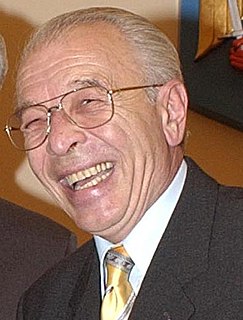
Nicolae Văcăroiu is a Romanian politician, member of the Social Democratic Party, who served as Prime Minister between 1992 and 1996. Before the 1989 Revolution he worked at the Committee for State Planning, together with Theodor Stolojan.

The Order of the White Lion is the highest order of the Czech Republic. It continues a Czechoslovak order of the same name created in 1922 as an award for foreigners. It was inspired by the Czech Nobility Cross created in 1814 by the Emperor and King Francis I and awarded to 37 Bohemian noblemen.

The Italian Parliament is the national parliament of the Italian Republic. It is the representative body of Italian citizens and is the successor to the Parliament of the Kingdom of Sardinia (1848–1861), the Parliament of the Kingdom of Italy (1861–1946), the transitional National Council (1945-1946) and the Constituent Assembly (1946-1948). It is a bicameral legislature with 945 elected members and a small number of unelected members (parlamentari). The Italian Parliament is composed of the Chamber of Deputies and Senate of the Republic. The two Houses are independent from one another and never meet jointly except under circumstances specified by the Constitution of Italy.
Hero of Ukraine (HOU) is the highest national title that can be conferred upon an individual citizen by the President of Ukraine. The title was created in 1998 by President Leonid Kuchma and as of 25 March 2020 the total number of awards is 460. The title is granted to two different order recipients, a civilian Order of State and a military Order of Gold Star. The first foreigner awarded the award was Belarusian Mikhail Zhyzneuski in June 2017.
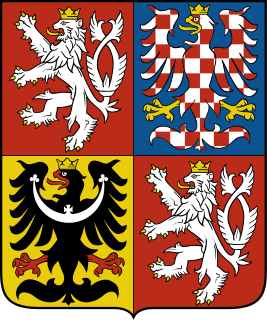
The Parliament of the Czech Republic or just Parliament is the legislative body of the Czech Republic, seated in Malá Strana, Prague.

The Senate of the Parliament of the Czech Republic, usually referred to as Senate, is the upper chamber of the Parliament of the Czech Republic. The seat of the Senate is Wallenstein Palace in Prague.
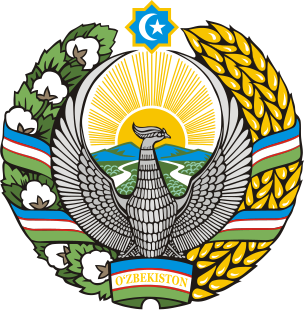
The president of the Republic of Uzbekistan is the head of state and executive authority in Uzbekistan. The office of President was established in 1991, replacing the position of Chairman of the Presidium of the Supreme Soviet of the Uzbek SSR, which had existed since 1925. The president is directly elected for a term of five years, by citizens of Uzbekistan who have reached 18 years of age.

The Romanian Ombudsman is an independent institution of the Government of Romania, responsible for investigating and addressing complaints made by citizens against other government institutions.
After World War I, Czechoslovakia established itself and as a republic and democracy with the establishment of the Constitution of 1920. The constitution was adopted by the National Assembly on 29 February 1920 and replaced the provisional constitution adopted on 13 November 1918.
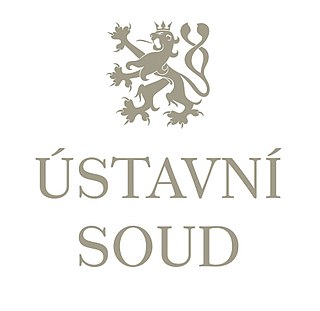
The Constitutional Court of the Czech Republic is a specialized type of court which primarily works to protect the people in the Czech Republic against violations of the Constitution by either the legislature, government or by any other subject that violates people's constitutional rights and freedoms. In this respect, it is similar in functionality to the Supreme Court of the United States, but is distinct from the Supreme Court of the Czech Republic. Of all the various levels of the Czech Judiciary it is the one created with the greatest specificity in the constitution.

Gun laws in the Czech Republic in many respects differ from those in other Member states of the European Union (see Gun laws in the European Union). A gun in the Czech Republic is available to anybody subject to acquiring a shall issue firearms license. Gun licenses may be obtained in a way similar to a driving license – by passing a gun proficiency exam, medical examination and having a clean criminal record. Unlike in most other European countries, the Czech gun legislation also permits a citizen to carry a concealed weapon for self-defense – 248,278 out of 305,452 legal gun owners have a concealed carry permit. The vast majority of Czech gun owners possess their firearms for protection, with hunting and sport shooting being less common.

Czech law, often referred to as the legal order of the Czech Republic, is the system of legal rules in force in the Czech Republic, and in the international community it is a member of. Czech legal system belongs to the Germanic branch of continental legal culture. Major areas of public and private law are divided into branches, among them civil, criminal, administrative, procedural and labour law, and systematically codified.
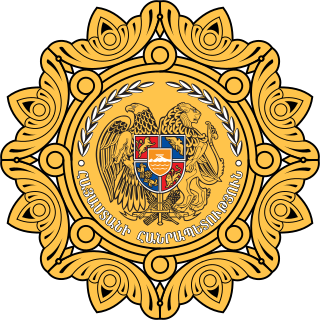
The President of Armenia is the head of state and the guarantor of independence and territorial integrity of Armenia elected to a single seven year term by the National Assembly of Armenia. Under Armenia's parliamentary system, the President is simply a figurehead and holds ceremonial duties, with most of the political power vested in the Parliament and Prime Minister.
The Greek honors system goes back to 1829 and the establishment of the Order of the Redeemer at the Fourth National Assembly at Argos. However, the relevant decree was signed in Nafplio by King Otto on May 20, 1833. The Grand Cross of the Order of the Redeemer remains the highest honor of Greece to this day.














